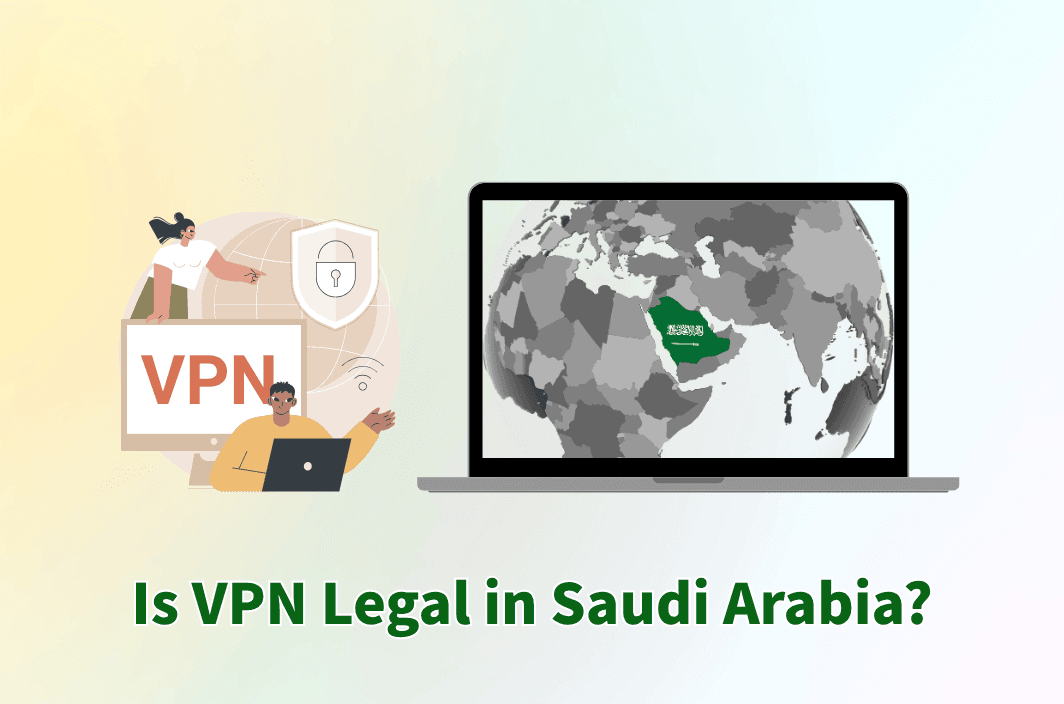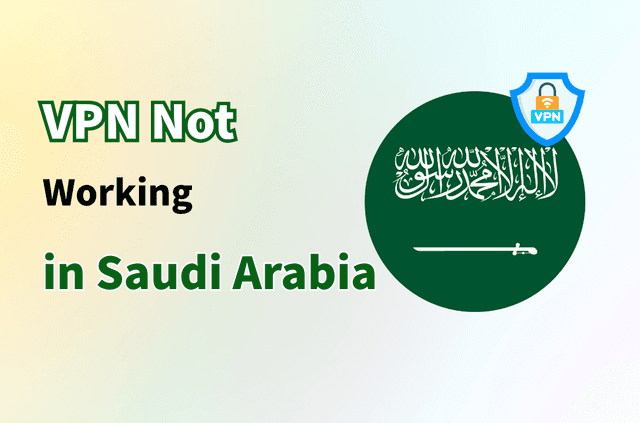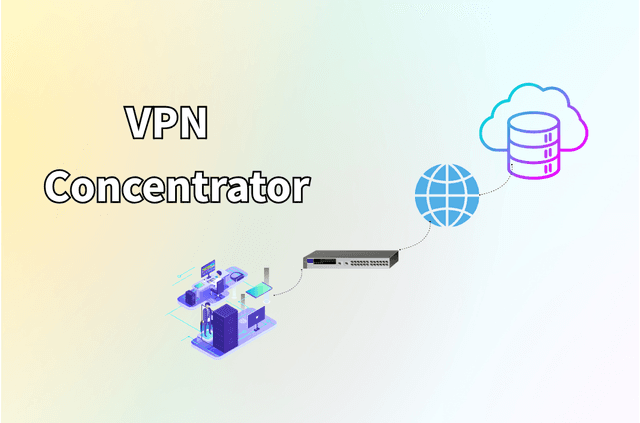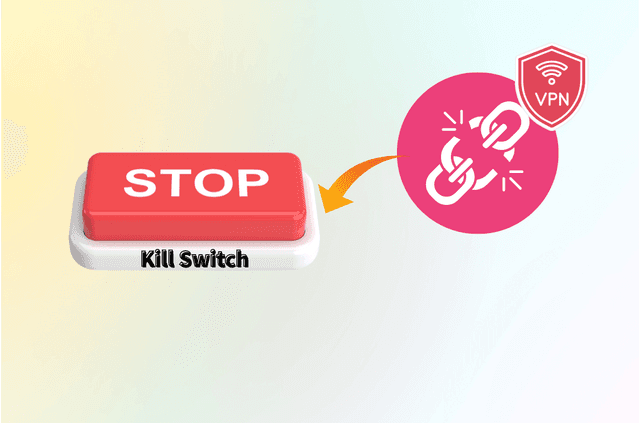If you’re traveling to, living in, or doing business with the Kingdom of Saudi Arabia (KSA), you’ve probably searched “is VPN legal in Saudi Arabia” and found conflicting answers. The short version is that a VPN is a tool, not a permission slip; the legality turns on what you do with it. This guide explains the legal landscape in plain language, highlights the risks that actually matter, and shows you how to configure a VPN responsibly.
Is a VPN Legal in Saudi Arabia? The Short Answer
Before choosing a service or tweaking settings, it’s crucial to align expectations. The question isn’t only “are VPNs legal in Saudi Arabia?” but also “what conduct becomes illegal even if a VPN is used?” Understanding that distinction will shape how you install, connect, and act online.
In general, VPN software itself isn’t banned as a category. Companies rely on it for secure remote access; travelers use it to protect data on public Wi-Fi. The red line is usage. If you use a VPN to engage in activities that are prohibited under local law—such as accessing legally restricted content, evading law-enforcement measures, or committing cyber offenses—the tool won’t shield you from legal consequences. That is why guidance about “is it safe to use VPN in Saudi Arabia” inevitably pairs safety tips with a reminder to stay within the law.
A Privacy-First Option in Saudi Arabia: BearVPN (Use Responsibly)
After clarifying that VPN legality in KSA hinges on how you use it, the next step is picking a tool that keeps you connected while minimizing exposure. BearVPN earns a spot on your shortlist because it bakes core safeguards into simple defaults and stays usable under pressure.
When networks are uneven or certain endpoints are intermittently filtered, you don’t want to babysit settings—you want a client that quietly does the right thing. BearVPN focuses on that “time-to-safe” experience: one-tap connect across iOS, Android, macOS, and Windows, a clean interface, and sensible automatic choices that don’t assume you’re a networking expert.
- Stealth & Reachability: Built-in traffic obfuscation helps sessions establish when standard handshakes struggle. If a route drops, a system-level Kill Switch fails closed, so traffic doesn’t spill onto open networks.
- Privacy by Design: DNS & IPv6 leak protection, strict no-logs, RAM-only servers, IP masking, and modern encryption reduce residual data on disk and curb incidental exposure during Wi-Fi handoffs or captive-portal logins.
- Speed & Stability: Optimized paths for high-speed browsing, streaming, and gaming aim for low latency rather than just peak throughput, which is critical on variable KSA links.
- Control When You Need It: Per-app (split-tunneling) controls let you route only selected apps through the tunnel—useful if a bank or government portal rejects VPN IPs while you keep everything else protected.
- Global Coverage, Practical Access: A broad server footprint enables quick IP rotation and access to major streaming platforms like Netflix, Hulu, and YouTube (availability can vary; no provider can guarantee 100% in every region).
- Operational Practicalities: If a primary domain is unreachable, support can provide mirror links or alternate endpoints; grab these and update the client before travel so you’re not configuring under time pressure.
How to get the most from BearVPN in KSA (lawfully): enable obfuscation from day one, keep the Kill Switch on, verify for DNS/IPv6 leaks after connecting, and use the tunnel only for permitted activities. The result is what matters most on the ground: connections that are accessible, steady, and discreet without adding complexity.
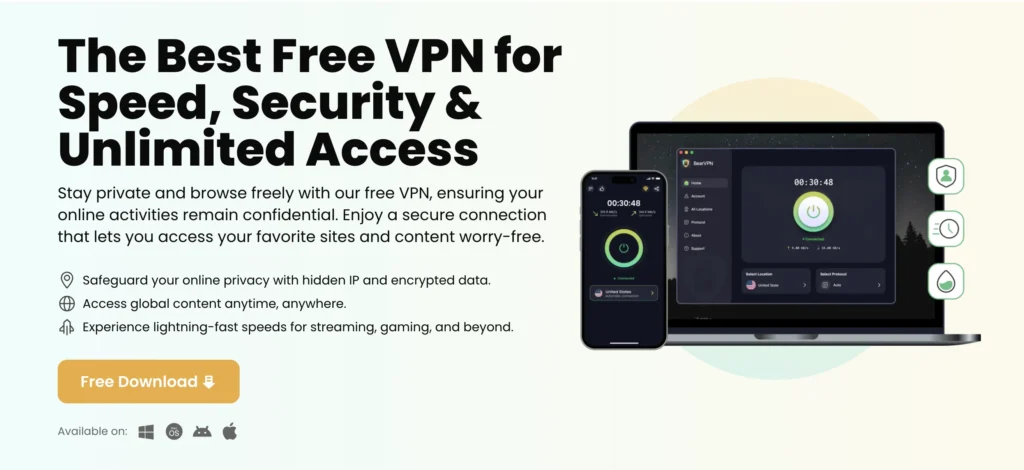
How Internet Restrictions Are Enforced in Saudi Arabia
Knowing how restrictions work in practice helps explain why “VPN websites blocked in Saudi Arabia” and intermittent connectivity happen. It also informs which app settings you should try first when connections fail or slow down.
KSA’s internet environment includes filtering of certain categories of content and, at times, interference with traffic that looks like VPN handshakes. You might find that some provider domains are inaccessible, specific protocols drop more frequently, or speeds vary by location and ISP. None of this automatically means “VPN illegal in KSA”—it means you’ll need the right combination of protocol, port, and obfuscation to stay connected for lawful use cases. Treat inconsistent reachability as a configuration challenge, not a license status.
What Could Get You Into Trouble (and What Usually Won’t)
This section exists to reduce risk. If your searches include “punishment for using VPN in Saudi Arabia”, the stakes are really about conduct rather than the app icon on your phone.
Common risk scenarios include: using a VPN to access content that local law prohibits; attempts to conduct fraud, piracy, or network intrusion; or any activity designed to evade legal obligations. On the other hand, typical low-risk uses—such as securing public Wi-Fi, authenticating to corporate resources, protecting online banking sessions, and basic privacy hygiene—are broadly consistent with why VPNs exist.
Regardless, you should review the latest local regulations, comply with the platform’s terms of service, and avoid assuming that a VPN legitimizes otherwise prohibited behaviors.
Features That Matter for a VPN in Saudi Arabia
Before you press “connect,” it pays to choose features aligned with KSA conditions. Many “best VPN for Saudi Arabia” roundups point to similar technical priorities; here’s how to think about them as a user.
Opt for obfuscation/stealth protocols that disguise VPN signatures when regular tunnels fail to connect. Keep a dependable kill switch on so your traffic doesn’t fall back to an exposed connection during drops. Turn on DNS and IPv6 leak protection to prevent data from leaking outside the tunnel.
Prefer providers that commit to a strict no-logs policy and, ideally, publish third-party audits. If a provider offers multiple protocol options (automatic, TCP, UDP, or proprietary stealth), try the “automatic/stealth” setting first. Finally, ensure there’s responsive support that can supply region-specific tips, alternative ports, or mirror links if the main site is unavailable.
Safe-Use Checklist: How to Configure Your App
A responsible setup dramatically reduces “operator error.” Even if you’re confident with networking, following a short routine can prevent common leaks that turn “is it safe to use VPN in Saudi Arabia” into a practical yes.
- Install and update before you need it. If you expect blocks, complete sign-up and download the latest version ahead of travel.
- Enable obfuscation or “automatic/stealth” mode. Let the app choose a less conspicuous protocol if your default fails.
- Turn on the kill switch. This prevents accidental exposure if the VPN drops mid-session.
- Activate DNS/IPv6 leak protection. Confirm the setting in your app preferences.
- Test before use. After connecting, run an IP and DNS check to ensure traffic resolves only through the tunnel.
- Use only for lawful purposes. A VPN doesn’t convert prohibited activity into permitted activity.
- Avoid account lockouts. If a bank or government portal misbehaves behind a VPN, disconnect, finish the task on a trusted connection, and then reconnect.
Troubleshooting: VPN Not Working in Saudi Arabia? Try These Fixes
Connection failures are common search triggers—“which VPN works in Saudi Arabia,” “VPN not working in Saudi Arabia”, and similar variants. Treat issues methodically rather than hopping between random servers.
- Start by switching protocols: if you’re on UDP, try TCP; if you’re on a legacy protocol, pick “automatic” or a stealth option.
- Change ports where the app allows it; some providers expose alternative ports that blend better with standard traffic.
- Move between nearby regions: sometimes the best results come from nodes with lower contention rather than the closest geography.
- Check device time and certificate stores; mismatches break TLS and tunnel negotiation.
- Update the client and reboot to clear stale tunnel states. If domains are blocked, use the provider’s mirror link or contact support for region-specific endpoints and configuration files.
- Finally, keep the kill switch on while you experiment—better a failed connection than an unprotected fallback.
How to Choose Responsibly: A Short Buyer’s Framework
If you prefer to compare several services before testing one, this framework will help you shortlist options when you search “which VPN works in Saudi Arabia.” The goal is to prioritize safety and reliability over marketing slogans.
- Connectivity under pressure. Pick vendors with proven obfuscation and fallback protocols; “automatic” should actually rotate intelligently.
- Protection that fails closed. The kill switch should be system-level, not app-only, and should handle brief reconnections gracefully.
- No-logs with evidence. Look for third-party audits, transparent privacy policies, and minimal telemetry.
- DNS discipline. The app must route all DNS through the tunnel and protect IPv6 paths.
- Timely support. You want responsive help when you need mirror links, alt ports, or stealth configs for KSA networks.
- Reasonable performance. Consistent speed beats impressive peaks; stability matters more than top-end throughput.
FAQs About Using a VPN in KSA
1. Will I get in trouble just for having a VPN app installed?
Possession of VPN software doesn’t, by itself, determine legality. Legal exposure arises from what you access or do—so keep usage squarely within local law and platform rules.
2. Why can’t I open some VPN websites or servers?
Website blocking and protocol interference occur. Use mirror links provided by your vendor, switch to obfuscation/stealth, and keep the app updated.
3. Is using VoIP or messaging apps via a VPN allowed?
Rules can change, and service-side blocks may apply independent of your VPN. If a platform disallows access from VPN IPs, using a tunnel won’t override that policy. Act lawfully and review current terms.
4. Can I use a VPN for work in Saudi Arabia?
Many organizations rely on VPNs for secure remote access. Follow your employer’s policies, and ensure your activity aligns with local regulations.
5. Which VPN actually works in Saudi Arabia?
“Works” depends on the day, network, and protocol. Look for providers with obfuscation, good uptime in multiple regions, and responsive support. BearVPN is one option to evaluate; enable its stealth settings and use it responsibly.
6. Is VPN banned in Saudi Arabia?
Using a VPN in Saudi Arabia is not strictly illegal by itself.
However, if you use a VPN to access content or services that the government bans (like certain websites, gambling, or politically/religiously-sensitive material), that is illegal and you could face fines or other penalties.
Conclusion
A VPN in Saudi Arabia is best understood as a protective conduit whose legality rides on how you use it. If your activity is lawful, the VPN’s job is to add privacy, integrity, and safer connectivity—nothing more. Choose a provider with obfuscation, a reliable kill switch, and strict leak protections; configure it carefully; and validate your connection before doing anything sensitive. When problems arise, troubleshoot methodically instead of guessing. Finally, if you evaluate BearVPN, enable its stealth features, and use it responsibly.
